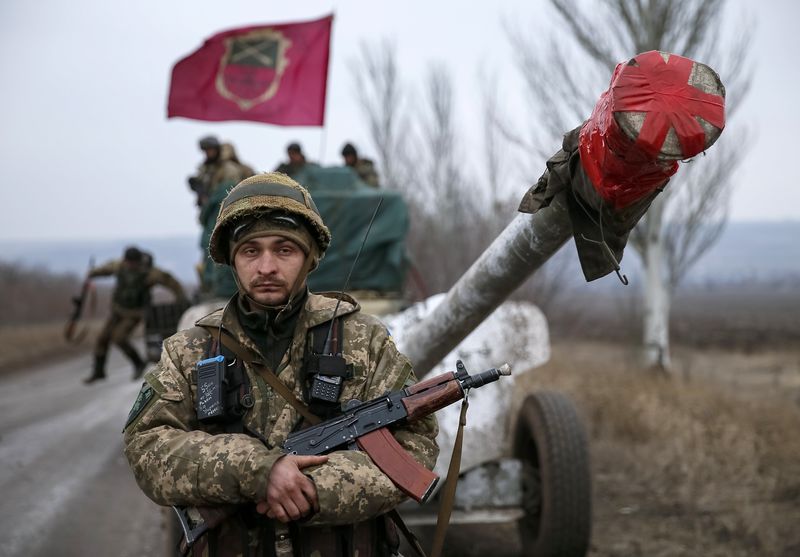By Natalia Zinets
KIEV (Reuters) - Ukraine on Friday reported the first deaths in three days in east Ukraine and President Petro Poroshenko said Russia would pose a "military threat" even if a ceasefire holds.
Government troops fighting pro-Russian separatists in the east began towing artillery away from the front line on Thursday, a sign the truce meant to begin on Feb. 15 could at last be taking effect.
But Kiev's military later announced the deaths of three servicemen in the past 24 hours, following two days with none.
"Even under the most optimistic scenario ... the military threat from the east would unfortunately remain," Poroshenko said in a televised speech, in a clear reference to Russia.
Kiev and Western governments have accused Russia of sending troops and weapons to support the separatists in east Ukraine, despite a peace deal agreed in the Belarussian capital Minsk on Feb. 12. Moscow has denied this.
Russian Foreign Minister Sergei Lavrov welcomed news that the two sides were pulling back heavy artillery. But he accused the West of pushing Kiev towards confrontation with Moscow.
"There is no objective precondition for calling this all a second Cold War. On the other hand, the hardening line that we see in some Western capitals goes beyond what we saw during the Cold War," Lavrov told a gathering at the Foreign Ministry's Diplomatic Academy.
The situation in the conflict zone was "relatively calm" overnight, Ukrainian military spokesman Anatoly Stelmakh said, although he reported isolated attacks by rebels on Ukrainian troop positions.
Ukraine continued to withdraw its weapons on Friday, but the army will remain on high alert, Defence Ministry spokesman Serhiy Galushko said in a televised briefing.
"Sufficient troops and resources remain along the front line in case the terrorists and the forces supporting them violate the ceasefire," he said.
The rebels, who committed to the truce only after seizing a strategic town in a humiliating defeat for Kiev, have been pulling back heavy weapons since Tuesday.
VERIFICATION
Alexander Hug, deputy head of the European rights and security group OSCE, said OSCE monitors in eastern Ukraine needed more access to check the combatants were fulfilling their promises to withdraw weapons.
"What we need to know is where those weapons were originally, along which routes they will be moved, and most importantly where they will be stationed or stored now, so we can be sure that they really have been withdrawn," he told Reuters.
"Our job is not to just observe but also to verify. That is a key difference."
Kiev says it fears the rebels could be regrouping and preparing to attack Mariupol on the Sea of Azov. Capturing the port city would help open up a corridor to the Crimean peninsula, which Russia annexed from Ukraine last year following the overthrow of a Moscow-leaning president in Kiev.
Military spokesman Andriy Lysenko said a convoy of GRAD missile systems and other equipment had been tracked leaving rebel-held Donetsk in the direction of Mariupol.

Moscow has in turn raised doubts about Kiev's commitment to the ceasefire and asked whether the United States and the European Union, which have imposed economic sanctions on Russia, really want the Feb. 12 peace deal to succeed.